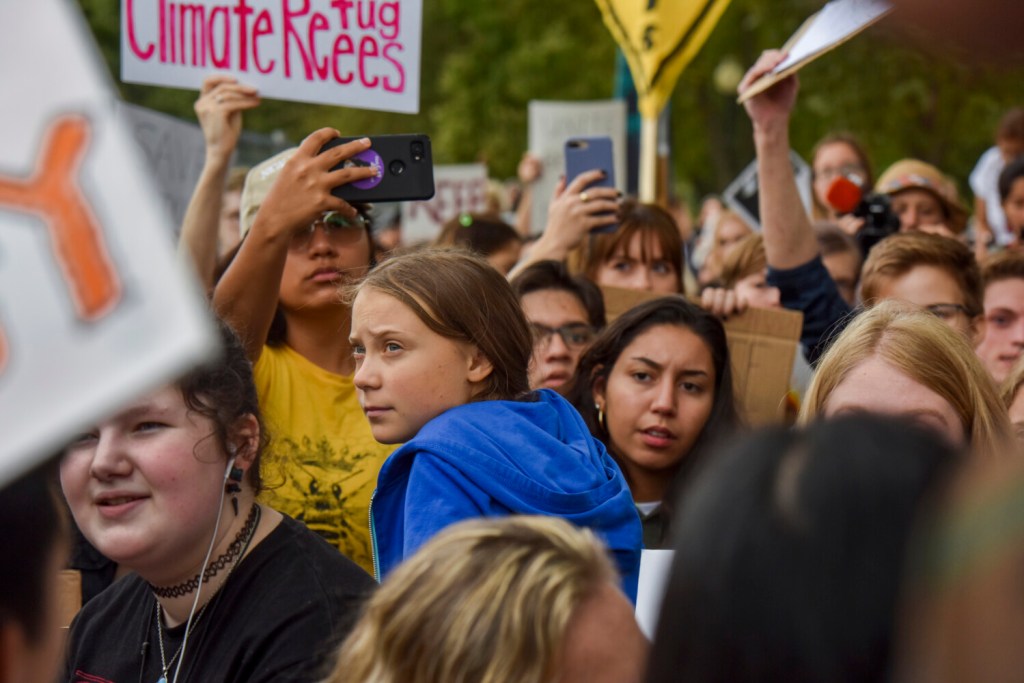Our world today faces unprecedented threats to environmental protection, human well-being, and sustainable economic development, none greater than climate change. We need to convince our decision-makers to take swift action, and this requires people mobilizing from all walks of life.
Right now, the world’s youth are organizing in savvy ways that are getting a lot of attention. As I write, young people everywhere are organizing climate strikes for Friday, Sept. 20, and are demanding that the world’s leaders take action on climate justice, indigenous sovereignty, sustainable agriculture, biodiversity protection, and a Green New Deal that pledges 100% renewable energy by 2030 and an end to new fossil fuel development.
This moment in time calls for a public discussion about what makes for successful advocacy, which will draw more people into the climate movement and will also show us why these youth climate activists are leading the way.
For the past 15 years, I have been teaching Colby students about environmental science, policy and activism. I’ve watched as students successfully led campaigns to get rid of plastic water bottles on campus, to pressure the college to divest from fossil fuel companies, and to call on Maine’s legislators to enact laws that protect public health from exposure to pollutants in our environment and toxic chemicals in our consumer products. Over the past week, Colby students have been organizing their own climate strike.
There is a well-worn formula for success in making change: identify the problem, develop policy solutions, communicate your vision to others to get them to join your cause, listen to diverse viewpoints, and then translate that people power into advocacy that compels decision-makers to take action.
Unfortunately, these lessons are not often taught in schools, but I am trying to help fill this gap. My vantage point is from higher education, but the lessons I’ve taught, and, importantly, learned, apply to all of us.
How can we help ensure that the voices of our youth are heard in public policymaking? First, we ought to educate ourselves about how policies are made and establish our own track records of advocacy, not just on environmental issues but on any issue of concern in the public sphere; this allows us to be role models for others seeking to engage.
Second, we ought to teach our youth about civics — what their roles and responsibilities are in a democracy, how governments work, how a bill becomes a law, and how laws are implemented and enforced.
Third, we ought to help students identify opportunities to practice and develop their organizing skills.
Where do these opportunities lie with respect to climate action? The climate strikes, taking place all over the world this week, will tell the world in a resounding way that young people, who have so much to lose in a warming world, are paying attention.
Next week, the United Nations Secretary-General António Guterres will host the 2019 Climate Action Summit in New York to jump-start momentum toward meeting global targets. Climate action at the national level has been stymied by the Trump administration, but markets for renewable energy have become much more favorable, and Rep. Chellie Pingree introduced the Coastal Communities Ocean Acidification Act of 2019, co-sponsored by Rep. Jared Golden and others, which passed the House in June.
States like Maine are taking bold climate action, and Gov. Janet Mills’ newly formed Climate Council will convene this month. Cities and towns, colleges and other institutions also have an important role to play. Colby was recently voted the top baccalaureate institution for campus sustainability (though no doubt our students will, and should, keep asking for more).
Learning how to organize, advocate and take action counters the hopelessness that so many of us feel in the face of seemingly insurmountable challenges. I tell my students all the time, “Don’t whine, do something!”
Fortunately, young people today are coming together to tell us that we have a moral obligation to address climate change and other forms of inequity in our society. They are effectively communicating that our leaders’ actions are inconsistent with our shared moral values. This is how the pressure points emerge and why new people are continually attracted to the cause.
Ultimately, this is about making the world more just and livable, and I for one am thankful for the empowered young people leading the way.
Gail Carlson teaches in the Environmental Studies Program at Colby College. She lives in Waterville.
Send questions/comments to the editors.



Success. Please wait for the page to reload. If the page does not reload within 5 seconds, please refresh the page.
Enter your email and password to access comments.
Hi, to comment on stories you must . This profile is in addition to your subscription and website login.
Already have a commenting profile? .
Invalid username/password.
Please check your email to confirm and complete your registration.
Only subscribers are eligible to post comments. Please subscribe or login first for digital access. Here’s why.
Use the form below to reset your password. When you've submitted your account email, we will send an email with a reset code.